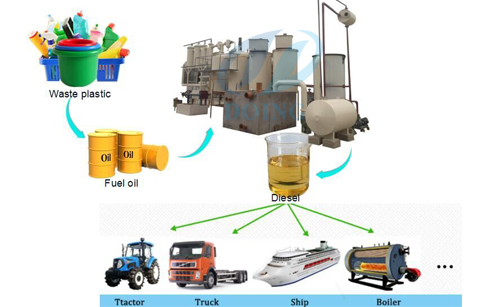
Plastic-to-Diesel, Pioneering Green Initiatives in Ayodhya’s Ram Nagri
As the city of Ayodhya undergoes a comprehensive transformation, propelled by religious tourism and infrastructure development centered around the grand Ram Temple, there’s a silent yet impactful initiative taking root in ‘Ram Nagri.’ This lesser-known endeavor aims to revolutionize plastic waste and litter management through the establishment of a 20 TPD (tonnes per day) Plastic-to-Diesel plant.
The Genesis of the Project: A Solution to Plastic Predicament
Amidst the bustling activities in Ayodhya, the Plastic-to-Diesel plant emerges as a solution to the persistent problem of plastic waste. Designed to handle both non-recyclable and recyclable plastic, this 20 TPD plant stands as a beacon of environmental care, offering an innovative approach to tackle plastic pollution in ‘Ram Nagri.’
Plant Operation: Converting Plastic Waste into Automotive Diesel
This section provides an insight into the workings of the Plastic-to-Diesel plant, showcasing how it handles the diverse spectrum of plastic waste to produce automotive diesel.
- Capacity and Scope: With a capacity of 20 tonnes per day, the plant is equipped to process various types of plastic waste, regardless of recyclability, and convert it into valuable automotive diesel.
- Inclusive Approach: The plant’s inclusive design ensures that both non-recyclable and recyclable plastics find a purpose in producing a resource that benefits the community – automotive diesel.
Ayodhya’s Environmental Renaissance: A Holistic Transformation
While Ayodhya undergoes a renaissance in religious and infrastructural aspects, the Plastic-to-Diesel plant contributes to a holistic transformation, specifically in the realm of environmental care.
- Comprehensive Waste Management: By addressing plastic waste and litter management, the project aligns with Ayodhya’s broader goal of creating a cleaner and more sustainable environment for residents and visitors alike.
- Environmental Harmony: The coexistence of religious, infrastructural, and environmental initiatives reflects Ayodhya’s commitment to maintaining harmony between development and ecological well-being.
Community Impact: Beyond Waste Conversion
The establishment of the Plastic-to-Diesel plant in Ram Nagri goes beyond waste conversion, positively impacting the local community.
- Employment Opportunities: The project creates employment opportunities, fostering economic growth within the community and contributing to the overall well-being of its residents.
- Local Energy Production: The conversion of plastic waste into automotive diesel not only addresses environmental concerns but also promotes local energy production, reducing dependency on external sources.
A Green Future for ‘Ram Nagri’
In conclusion, as Ayodhya experiences a multifaceted transformation, the 20 TPD Plastic-to-Diesel plant in Ram Nagri symbolizes a commitment to a greener future. By addressing plastic waste issues and contributing to local energy needs, the project showcases how environmental care can seamlessly integrate with broader development initiatives. As the grand Ram Temple becomes a cultural focal point, the silent revolution in ‘Ram Nagri’ ensures that Ayodhya’s growth is sustainable, inclusive, and environmentally conscious.





